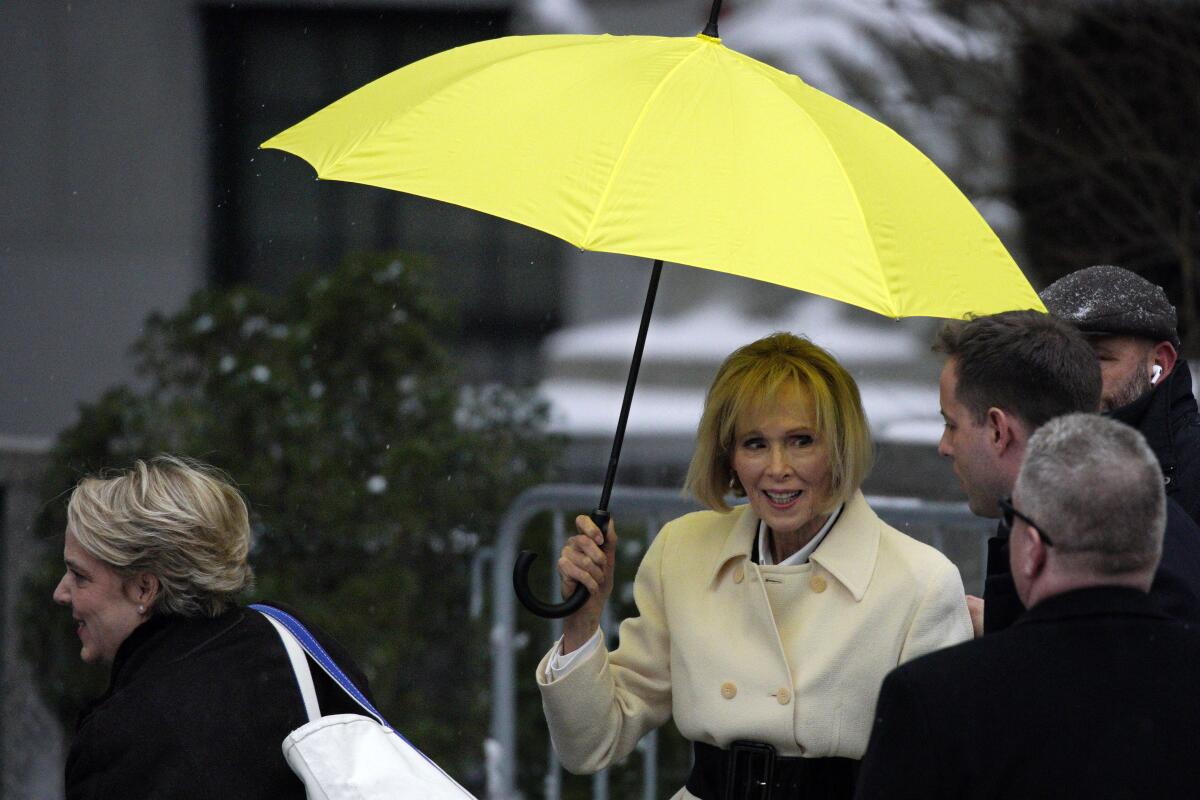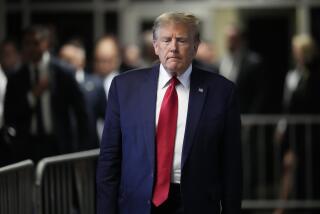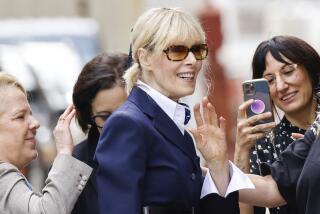Trump scowls as jury is picked to decide how much he owes for defamation in E. Jean Carroll case

NEW YORK — Former President Trump shook his head in disgust Tuesday as the judge in his New York defamation trial told prospective jurors that another jury had already determined that he had sexually abused columnist E. Jean Carroll in the 1990s.
Later, when the judge asked during jury selection whether anyone thought Trump had been treated unfairly by the court system, the ex-president raised his hand, drawing laughter from the crowd and a comment from the judge, who told Trump: “We know how you feel.”
Fresh from a political win Monday in the Iowa caucuses, the Republican presidential front-runner took a detour to a Manhattan courtroom for what amounts to the penalty phase of a civil defamation lawsuit stemming from the jury finding that he had sexually attacked Carroll in a department store dressing room.
Nine jurors were selected for the trial, which Judge Lewis A. Kaplan said is likely to last three to five days. Testimony is to begin Wednesday.
Trump did not attend the previous trial in the case in May, when a jury found he had sexually abused Carroll and awarded her $5 million in damages. In light of that verdict, Kaplan told prospective jurors Tuesday that the current trial would focus only on how much money, if any, Trump must pay Carroll for comments he made about her in 2019, while he was president.
The judge said that for purposes of the new trial, it had already been determined that Trump “did sexually assault Ms. Carroll” — prompting Trump to shake his head. The ex-president sat at the defense table, flanked by his lawyers, about a dozen feet from Carroll and her legal team. Trump and Carroll didn’t appear to speak or make eye contact.
As the day began, Kaplan rejected the defense’s request to suspend the trial on Thursday so Trump could attend his mother-in-law’s funeral. In a combative exchange, Trump’s lawyers accused the judge of thwarting their defense with pretrial evidence rulings that they contend favor Carroll.
“I am not stopping him from being there,” the judge said, referring to the funeral.
Trump lawyer Alina Habba responded: “No, you’re stopping him from being here.”
Habba told the judge that Trump plans to testify. Kaplan said the only accommodation he would make is that Trump can testify on Monday, even if the trial is otherwise finished by Thursday. He had previously rejected Trump’s request to delay the trial a week.
Trump sat attentively, glaring and scowling at times, as about six dozen prospective jurors filed into the courtroom and spent more than an hour responding to questions posed by the judge about their prior involvement with the judicial system and their political beliefs.
The former president twisted around in his chair and nodded at two prospective jurors — a man and woman — who stood when asked if they agreed with his false claim that the 2020 election was rigged, and again when three people in the pool indicated they believe the former president is being treated unfairly by the court system.
The process offered a window into the political beliefs of a microcosm of New Yorkers, drawn from a pool that includes Manhattan and northern suburban counties. Some said they had personal connections to Trump or his adversaries. One woman said she had done publicity for his daughter’s company. Another said her father provided moving services for some of Trump’s buildings. Neither made the cut.
Jurors selected for the trial will remain anonymous, even to the parties, lawyers and judicial staff, and will be driven to and from the courthouse from an undisclosed location for their safety, Kaplan said.
Trump has increasingly used his courtroom travails — including four criminal cases — in his bid to retake the White House, positioning himself as a victim of partisan lawyers, judges and prosecutors and capitalizing on news coverage of his court visits. Last week, he attended closing arguments in the New York attorney general’s fraud lawsuit against him — and gave a six-minute diatribe after his lawyers spoke.
“I guess you’d consider it part of the campaign,” Trump told reporters last week.
He fired off a series of social media posts about the case after arriving at the courthouse Tuesday via motorcade and entering through a special nonpublic entrance. Posting on his Truth Social platform, Trump wrote that Carroll’s rape allegation was an “attempted EXTORTION” involving “fabricated lies and political shenanigans.” He accused the judge of having “absolute hatred” for him.
Carroll, 80, plans to testify about the damage to her career and reputation that resulted from Trump’s public statements about her. She seeks $10 million in compensatory damages and millions more in punitive damages.
If Trump testifies, what he can say will be strictly limited. Due to the previous verdict, Kaplan has said, he cannot get on the witness stand and argue that he didn’t sexually abuse or defame Carroll.
In May, a jury awarded Carroll $5 million after concluding that Trump had sexually abused her in a department store dressing room in spring 1996, and had defamed her in 2022 by claiming she made up the assault, which she revealed publicly in a 2019 memoir. The jury said Carroll hadn’t proved that Trump had raped her.
Trump is appealing and hasn’t paid any of that award, though he placed $5.55 million in escrow to cover the verdict and other costs in the event he loses his appeal. One issue that wasn’t decided in the first trial was how much Trump owed for comments he made about Carroll while he was president. That will be the new jury’s only job.
Even before prospective jurors were brought into court Tuesday, Trump attorney Michael Madaio complained that the judge had made “inconsistent and unfair” pretrial rulings against Trump. He said the rulings “drastically changed our ability to defend this case and largely stripped us of our defenses.”
He also argued that given Trump’s pending appeal, the trial should not proceed at all.
Trump, 77, has continued to maintain that he doesn’t know Carroll, that he never met her at the Bergdorf Goodman store in Midtown Manhattan in spring 1996, and that Carroll made up her claims to sell her book and for political reasons — assertions that failed to persuade the previous jury.
More to Read
Get the L.A. Times Politics newsletter
Deeply reported insights into legislation, politics and policy from Sacramento, Washington and beyond. In your inbox three times per week.
You may occasionally receive promotional content from the Los Angeles Times.










